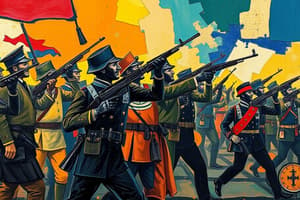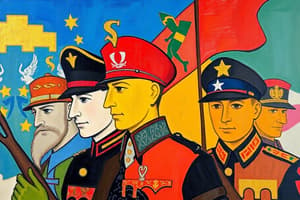Podcast
Questions and Answers
What were the MAIN causes of WWI?
What were the MAIN causes of WWI?
- Imperialism (correct)
- Alliances (correct)
- Nationalism (correct)
- Militarism (correct)
What is militarism?
What is militarism?
Militarism is when a country's military becomes stronger due to an increase in its military power, leading to an arms race.
How did militarism lead to WWI?
How did militarism lead to WWI?
Countries became more involved in military policies, creating tensions between nations.
What role did alliances play in the lead-up to WWI?
What role did alliances play in the lead-up to WWI?
Which countries were part of the alliances before WWI?
Which countries were part of the alliances before WWI?
What is imperialism?
What is imperialism?
How did imperialism lead to WWI?
How did imperialism lead to WWI?
What is nationalism?
What is nationalism?
How did nationalism lead to WWI?
How did nationalism lead to WWI?
What was the major cause that started WWI?
What was the major cause that started WWI?
What was the immediate cause of World War I?
What was the immediate cause of World War I?
Flashcards are hidden until you start studying
Study Notes
MAIN Causes of World War I
- Causes identified as Militarism, Alliances, Imperialism, and Nationalism.
Militarism
- Involves the strengthening of a country's military power resulting in an arms race.
- Heightened military involvement in public policy increased tensions among nations.
- By 1914, Germany experienced the greatest military expansion, prompting naval buildups between Germany and Great Britain.
- Militarism directly influenced countries to prepare for war.
Alliances
- European nations formed mutual defense agreements, leading to complex military entanglements.
- Key alliances included:
- Russia with Serbia
- Germany with Austria-Hungary
- France with Russia
- Ottoman Empire with Bulgaria
- Britain with France and Belgium
- Japan with Britain
- Austria-Hungary's war declaration against Serbia triggered a domino effect due to alliances, pulling multiple countries into conflict.
Imperialism
- Represents a country's expansion by acquiring control over additional territories, particularly in Africa and Asia.
- Competition for resources fueled tensions among European powers, contributing to the outbreak of war.
- Desire for greater empires and associated raw materials intensified confrontations.
Nationalism
- Loyalty to one's nation emphasized shared history and culture among populations.
- Nationalist desires led to tensions, particularly among Slavic peoples in Austria-Hungary seeking independence.
- Competition for dominance among nations fueled both the start and escalation of the war.
Immediate Cause
- The assassination of Archduke Franz Ferdinand of Austria-Hungary in June 1914 acted as the catalyst for WWI.
- The assassination occurred in Sarajevo, Bosnia, as a protest against Austria-Hungary's control of the region.
- This incident initiated a chain reaction: Austria-Hungary declared war on Serbia, prompting Russia's mobilization and leading Germany to declare war on Russia, expanding the conflict further.
Studying That Suits You
Use AI to generate personalized quizzes and flashcards to suit your learning preferences.




